2027: El-Rufai lacks power to influence Northern against Tinubu, says Arewa youth president

By Adeniyi Yusuf The National President of the Arewa Youth Consultative Council, Zaid Ayuba, has said the former governor of Kaduna State, Nasir El-Rufai does not have the capacity to influence the northern youths’ decision against President Bola Tinubu. This followed El-Rufai’s interview, condemning the president’s economic reforms. He narrated, “I support some of (Tinubu) policies; most of the economic policies are the right orthodox policies, but the sequencing is wrong, and the quality of the people implementing the reforms leaves much to be desired. And I think that some of the reforms are just wrong. “You don’t address food inflation by destroying domestic agriculture. Food prices may be going down, but farmers are being impoverished because they are being made to compete with subsidised agricultural products from Europe and other countries. “So, I have issues with many of them, and I’m in touch with many senior officials of the administration, and I give them my opinion privately.” While speaking, he pointed out that the President cancelled him as a ministerial nominee and not the National Assembly, as initially stated. He said, “Since I left office and the President begged me publicly to come and serve in his government, I had my plans and told President Tinubu from day one when he asked me to support him, I said would, but I don’t want anything because politics in Nigeria is always about what do I get for giving you support. “I’m not in politics for that reason. I’m not in politics to get anything. I have a surname, and I’m a self-made man. I’ve made money before coming into public office. ‘’I don’t need anything. After eight years in Kaduna, I was nearly burnt out. I was struggling for eight years, and I wanted to take a break, and I had my private plans.” Reacting in an exclusive interview with The New Daily Prime, Zaid noted that El-Rufai did not have the backing of northern youths. He added that there was no section of the north that would succumb to his calling. Zaid stated, “I am not saying that the north will support President Bola Tinubu come 2027 or not. I am saying that as far as I am concerned, El-Rufai does not have the capacity to influence the decision of the northern youths. “Everyone knows that he is saying what he is saying because he missed out on the political appointments. “Although, there are a lot of unfavourable policies under this government that have plunged the life of ordinary people. They have affected the people negatively despite that he said he is doing it for the good of the nation.” The national president stressed that El-Rufai was trying to take advantage of these sufferings because the masses were not happy. He noted, “For instance, the removal of fuel subsidy, refusal to open the border for continuous inter-border trade and others. “By 2027, it will be seen that he does not have a capacity to do anything. The president must try to do something that is directly affecting the socio-economic life of the people, this will make people support him. Northern Nigeria has govern for eight years by President Muhammadu Buhari. “We have political integrity in the north. We believe that the south deserves to rule for eight years. But these policies by the federal government we are not happy with it. He should refine these policies and let them yield goodness for the people.” Read Also: Onanuga: El-Rufai still bitter over ministerial snub Read Also: APC confirms Tinubu’s attendance at national caucus meeting
Trump moves to scrap New York’s congestion charge, sparks legal battle
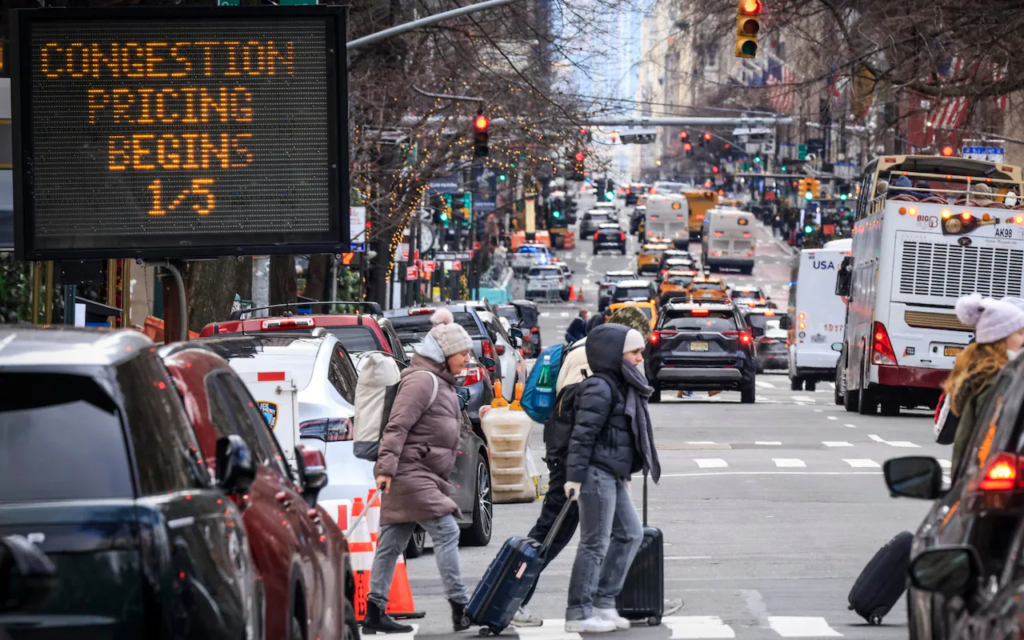
New York, NY – The Trump administration has taken decisive action to eliminate New York City’s controversial congestion charge, a policy that has been widely criticized by drivers. In a letter to New York Governor Kathy Hochul, U.S. Transportation Secretary Sean Duffy announced that the Federal Highway Administration had revoked federal approval for the tolling program. Duffy stated that the administration would work with the New York State Department of Transportation to implement an “orderly termination” of the tolls. However, no date has been provided for when the reversal will take effect. The congestion pricing plan, which requires motorists to pay a $9 daily fee to enter lower Manhattan below 60th Street, had finally gone into effect on January 5, 2025, following years of debate and delays. President Donald Trump, who had pledged to dismantle the program during his campaign, celebrated the move, likening himself to royalty. Read Also: Trump open to deals with Russia, says Ukraine war could end within weeks “CONGESTION PRICING IS DEAD. Manhattan, and all of New York, is SAVED. LONG LIVE THE KING!” — Donald Trump, via Truth Social New York Governor Fights Back Governor Kathy Hochul swiftly responded to Trump’s statement, dismissing his declaration of victory and asserting her administration’s intent to fight the decision in court. “We are a nation of laws, not ruled by a king. The MTA has initiated legal proceedings in the Southern District of New York to preserve this critical program. We’ll see you in court.” — Governor Kathy Hochul Congestion Pricing’s Impact & The Growing Divide Governor Hochul defended the congestion pricing plan, arguing that it had significantly reduced traffic congestion in Manhattan. The Metropolitan Transportation Authority (MTA) reported that weekday traffic inside the congestion zone during the first week of February was down by 9% compared to the previous year. Hochul further claimed that support for the policy was increasing daily, despite its critics. However, Sean Duffy called the congestion pricing program “backwards and unfair,” saying it disproportionately affects working-class Americans and small business owners. share the president’s concerns about the impact on working-class Americans who now have an additional financial burden to account for in their daily lives.” — Sean Duffy, U.S. Transportation Secretary The battle over congestion pricing has also drawn in New Jersey Governor Phil Murphy, a Democrat, who has long opposed the program and launched several legal challenges against it. Murphy and other opponents argue that congestion pricing unfairly penalizes commuters from New Jersey and outer borough residents, many of whom have limited public transportation options. While congestion pricing was designed to reduce traffic, cut emissions, and generate revenue for public transit, its implementation has remained politically divisive. Last summer, Governor Hochul temporarily paused the plan, fearing that it could negatively impact local Democratic candidates in upcoming elections. With Trump’s administration pulling federal approval and Hochul taking the case to court, New York’s congestion pricing policy is now at the center of a high-stakes legal and political battle. Will Trump successfully dismantle the program, or will Hochul and the MTA prevail in their legal fight to keep it in place? Stay tuned as New Daily Prime continues to bring you the latest updates on this developing story
CBN’s new condition stalls LG Autonomy

By Damilola Olufemi Federal vs State Power Struggle: Can Local Governments Autonomy? In a landmark ruling, the Supreme Court on July 11,2024 ordered the federal government to bypass the state governments and directly pay revenue allocations to local government councils,yet this directive is mostly observed in the breach by some governors.In this report, Damilola Olufemi who sought the views of experts on the issue,unveils the many challenges encountered in implementing the order, stressing that there are lots of advantages in obeying the court’s ruling. The lawsuit which was instituted by the Attorney General of the Federation and Minister of Justice, Lateef Fagbemi (SAN), sought to grant full autonomy and direct funding to all the 774 local government councils in Nigeria.In its ruling, the apex court affirmed that states’ retention of local government funds is unconstitutional and was outlawed. The Supreme Court verdict is aimed at promoting transparency and accountability in the administration of public funds.Also, the ruling is a significant victory for local government autonomy and a major setback for state governments that have historically controlled local government funds for a very long time. The apex court’s ruling emphasised the importance of direct funding for local governments, stressing “The demands for justice require a progressive interpretation of the law. It is the position of this court that the federation can pay local government allocations directly to the LGs or through the states.” The court further stated that since payment through states has not worked, the justice of the matter demands that local government allocations from the federation account should henceforth be paid directly to them. The implications of the ruling are far-reaching. By granting autonomy to local governments, the Supreme Court’s decision aims to ensure that funds intended for local governance are utilised effectively. This move is expected to promote grassroot development and reduce the influence of state governments on local affairs.In the same vein,local governments will now have the freedom to prioritize their needs and allocate resources accordingly, without interference from state governments. However, despite assurances from the Federal Government that local governments would start receiving direct allocations by January 2025,the implementation of the apex court ‘s verdict has been slow. There has been various hurdles put on way for the seamless implications of the court’s ruling . Meanwhile, the Central Bank of Nigeria(CBN) recently introduced a new condition requiring all the 774 local government councils in the country to provide at least two years of audited financial reports before they can receive their allocations directly. This requirement has raised concerns among local government officials, who argue that it may delay the implementation of the Supreme Court’s ruling. The delay in implementing the order has also raised concerns about the commitment of the Federal Government to ensure true local government autonomy.Many stakeholders have expressed worries why the federal government has not taken concrete steps to ensure that local governments receive their allocations directly.The lack of transparency and accountability in the allocation of local government funds has historically been a major challenge in Nigeria. The Supreme Court’s ruling was seen as a major step towards addressing this challenge, but the delay in its implementation has raised doubts about the government’s commitment to reforming the grassroot administration. However, there are also concerns that the ruling could be resisted by state governments, which have historically controlled local government funds. Some state governments may try to find ways to circumvent the ruling or delay its implementation. This could lead to protracted legal battles, which could undermine the effectiveness of the ruling. Read Also: Experts’ Opinions on the Verdict Some legal experts and public commentators have weighed in on the implications of the apex court ‘s ruling.Mr Emmanuel Akinola, a Public Affairs analyst, described the ruling as step towards ensuring that the dividends of democracy get to the grassroot.He added, “This ruling is a significant milestone in promoting grassroot development, good governance, and democratic decentralization in Nigeria.” The Kogi-based analyst further noted that the verdict will ensure that funds intended for local governance are utilised effectively and will promote transparency and accountability in the administration of public funds.A lawyer, Barr. Ibrahim Lawal, however, decries the non implementation of the apex court ruling,saying that such an action runs against the tenets of democracy and is like taking the law for granted. “This ruling is a victory for local government autonomy and a major setback for state governments that have historically controlled local government funds. According to him, “this will reduce the influence of state governments on local affairs and give local governments the freedom to prioritise their needs and allocate resources accordingly.” For Amaka Theophilus, the Supreme Court’s ruling is a significant step towards promoting transparency and accountability in government. Sharing her view while speaking with New Daily Prime, Amaka noted that the ruling reflects the court’s commitment to upholding the principles of federalism and promoting good governance. “However, the success of this ruling will depend on the ability of local governments to manage their finances effectively and provide essential services to their communities,” she said In the same vein, a legal scholar expert, Adeola Aluko, stated that the ruling is expected to have a significant impact on the lives of ordinary Nigerians.He further added that by ensuring that local governments receive their allocations directly, “the ruling is expected to promote grassroots development and improve the delivery of essential services such as healthcare, education, and infrastructure. However, there may be challenges in implementing this ruling, particularly from state governments that may resist the loss of control over local government funds.”Notwithstanding the stated challenges, the Supreme Court’s ruling on local government autonomy is a significant milestone in Nigeria’s democratic journey. It reflects the court’s commitment to upholding the principles of federalism and promoting transparency and accountability in government. As Nigeria continues on the path of decentralisation, the success of this ruling will depend on the ability of local governments to manage their finances effectively and provide essential services to their communities. The apex court’s ruling
Police bias in Osun LG poll preparation – Analyst
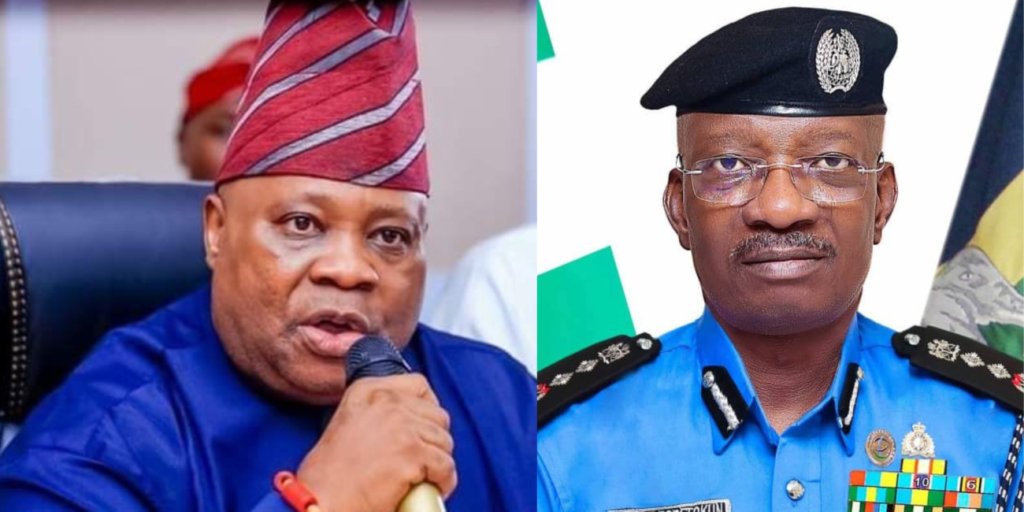
A political analyst, Abdulateef Ahmed, has said the actions of security operatives, particularly the police, during the recently concluded local government election in Osun State. The New Daily Prime gathered that tensions ran high in the state in the lead-up to the election, as the Inspector-General of Police (IGP), Kayode Egbetokun, and the Attorney General of the Federation, Lateef Fagbemi, called for its suspension. Despite this, the police deployed a tactical squad to local government secretariats as the election progressed. During the exercise, the Chairman of the Osun State Independent Electoral Commission (OSSIEC), Hashim Abioye, raised alarm over the arrest of commission officials by the police. Following the election, Governor Ademola Adeleke swore in the newly elected chairmen from the 30 local government areas—all members of the Peoples Democratic Party (PDP)—and instructed them to stay away from the secretariats. Reacting to the police actions before, during, and after the election, Mr Ahmed, in an exclusive interview with this newspaper, stated that the police conduct suggested political bias or intimidation. READ ALSO: Osun: PDP wins all 30 chairmanship, 332 councillorship seats He further asserted that such actions eroded public trust in the electoral system. He said: “First, it is most unfortunate that senseless politically-motivated killings happened a few days after the Southwest governors showed exemplary leadership promising to tackle insecurity in the region. “Democracy thrives on free, fair, and transparent elections, but it also requires respect for institutions and adherence to legal procedures. The events in Osun raise concerns about the consolidation of democracy in Nigeria.” He stated that true democracy requires not only the ability to conduct elections but also post-election stability, ensuring that electoral institutions operate effectively without undue interference. According to him, the actions of security operatives in the recently concluded election indicate that the country is still struggling with democratic maturity, as political competition often escalates into security and institutional conflicts. Mr Ahmed asserted that the Osun LG election highlights the deep-seated political divide between parties in Nigeria. READ ALSO: AGF calls for cancellation of Osun LG election amid political crisis “While it is commendable that the election was conducted successfully, the pre-election violence and post-election security clampdown highlight recurring democratic challenges. Governor Adeleke’s gratitude to President Tinubu and the electoral body may indicate an attempt at political reconciliation. “But the sealing of the electoral commission’s office raises questions about the independence of institutions. For Nigeria’s democracy to grow, there must be clear, impartial application of the law, respect for democratic institutions, and an end to the use of security forces as political tools”, said Mr Ahmed. He emphasised that sealing off the electoral commission’s office and arresting officials after the election raise serious concerns about the rule of law and the integrity of the electoral process. “If the election was indeed smooth, as suggested, then such actions contravene the spirit of democracy. It shows some underlying political interference, attempts to challenge the legitimacy of the process, or preemptive measures to prevent alleged irregularities. “It was expected that the Police will provide clear justification for their actions, otherwise, it risks being seen as a misuse of state security forces for political ends.”
Over 6,000 teachers to receive training on AI pedagogy
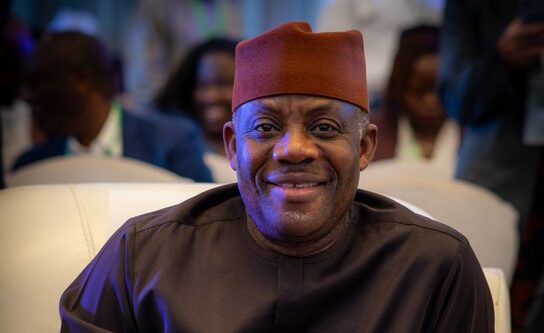
To improve the Nigeria education sector, the Federal Government says that over 6,000 teachers are to be trained in an Artificial Intelligence (AI) in Pedagogy training programme after its launch. The development aims to aid innovative, technologically driven education and enhance teaching methods across the Nigerian secondary schools. The initiative was organised by the National Senior Secondary Education Commission (NSSEC) with the sponsorship of Google Research and supported by both Data Science Nigeria and Olabisi Onabanjo University Ogun State. During the launching ceremony held in Abuja on Tuesday, the event witnessed the revelation of the Minimum Standards for Senior Secondary Education in Nigeria. This framework ensures consistency, accountability, and measurable improvements across schools. The Minister of Education, Dr. Tunji Alausa, noted that the training exercises cut across the 36 states and the Federal Capital Territory (FCT) senior secondary teachers of the country. Alausa emphasised that it was a collective commitment to equip the teachers with the necessary skills to prepare our students for the rapidly evolving digital age. Representing the Minister of Education, the Ministry’s Director of Basic and Secondary Education, Hajia Binta Abdulkadir, explained this initiative aligns with President Bola Tinubu’s Renewed Hope Agenda in reforming the educational sectors with advanced skills. This initiative aims to enhance digital literacy and modernise the education system. The Minister of Education emphasised AI’s role in shaping the future, stating, “AI is no longer a futuristic concept but a present-day reality, transforming industries, economies, and societies.” He urged educators to embrace AI-driven teaching to enhance learning, personalise education, and develop students’ critical thinking skills. A special training program will equip selected teachers with AI-based teaching strategies. The minister encouraged participants to embrace the training, emphasising their role in shaping a tech-savvy generation. NSSEC boss, Dr. Iyela Ajayi, noted disparities in curriculum, teaching quality, infrastructure, and learner outcomes. “These inconsistencies have contributed to uneven access to quality education, limiting the potential of many learners,” he said. The new standards set benchmarks for learning content, teacher qualifications, facilities, assessments, and governance. However, the five-week training programme, structured into five modules, aims to enhance teaching methodologies. Mohammed Salihu, Head of Teacher Development and International Partnership, stated that 130 teachers will be selected from each state and 11 from federal unity colleges. These educators will lead AI-driven learning, preparing students for a technology-driven world. READ ALSO: Shettima hails NEDC’s investment in education, green tech
“Failed trophy wife” — Ehi Ogbebor slams Caroline Danjuma, Sophia Momodu harshly

Ehi Ogbebor fires back at Caroline Danjuma and Sophia Momodu after their critical remarks about her on The Real Housewives of Lagos (RHOL). The reality show, which highlights the extravagant lifestyles of Lagos elites, became a battleground for the three women during its latest episode. Caroline Danjuma calls out Ehi Ogbebor Caroline Danjuma, a well-known actress and businesswoman, did not hold back her feelings toward Ehi during the episode. She openly admitted that she dislikes the interior decorator, citing past conflicts over a contract. “I don’t like Ehi. I was working on a contract job, and she questioned why I was given the project,” Caroline stated. “Then, I attended a prominent man’s party, and she asked why I was invited. So, I do not like her. I won’t pretend otherwise.” Her blunt remarks set the stage for an intense exchange, drawing reactions from fans and cast members. Sophia Momodu dismisses Ehi Ogbebor Adding to the controversy, Sophia Momodu, the mother of singer Davido’s first child, claimed she had no idea who Ehi Ogbebor was. Her statement seemed to downplay Ehi’s status, fueling the tension. Ehi Ogbebor fires back Ehi Ogbebor did not let the comments slide. In a voice note posted on her Instagram page, she slammed Caroline Danjuma, questioning her mental stability. “I have heard people say you have mental issues,” Ehi said. “Caroline Hutchins, leave Danjuma’s name. The man has moved on. You don’t even deserve my response, but I can’t help it. You are a failed trophy wife, a failed baby mama, and a failed runs girl. You have failed in everything.” She went on to mock Caroline’s reputation, claiming that her only achievement was being married to a wealthy man. “You always brag about being a rich man’s wife. That’s your only certificate in life. I am a Benin girl. I don’t fake things. Ask people who know me. I don’t play pretend. Mad woman,” she added. Ehi warns Sophia Momodu Ehi also took a shot at Sophia Momodu, accusing her of living a fake lifestyle. She warned Sophia to be cautious, implying that she had known her long before the social media fame. In another Instagram post, Ehi shared a clip from the reality show, calling out Sophia’s attempt to dismiss her. “It’s Sophie asking who Ehi is. Sophie, please don’t go there. I won’t say more. I have known you even before this fake Instagram life,” she wrote. Social media reactions The drama has since gone viral, with fans taking sides in the ongoing feud. Some supported Ehi’s fiery response, while others criticised her for being too harsh. Many also questioned the authenticity of reality TV conflicts, suggesting the show thrives on controversy. With tensions running high, whether Caroline or Sophia will respond to Ehi’s explosive remarks remains to be seen. Meanwhile, The Real Housewives of Lagos continues to deliver the drama its audience craves. Read Also: I swore never to have a child unmarried – Ruggedman
‘I gave God ultimatum to either kill me or fulfil his promise in my life’ – Actress Dayo Amusa

Nollywood actress Dayo Amusa shares her emotional journey to motherhood, revealing the heartbreak, medical struggles, and deep faith that shaped her path. In a candid interview with fellow actress Debbie Shokoya, Amusa revealed how she once broke down in tears in front of her domestic staff, crying out to God for a child. She described the moment as one of absolute desperation, where she gave God an ultimatum—either grant her a child or take her life. The struggles of infertility The actress, known for her powerful performances on screen, recounted the pain she endured while battling infertility. She went through numerous medical tests and multiple surgeries, hoping for a miracle. Despite her best efforts, nothing seemed to work. “I remember singing at the top of my voice,” she said, her voice filled with emotion. “I cried so deeply, not caring that my maid and domestic workers were there. I told God, ‘It’s either You take my life at this moment or You fulfill Your promise to me.’ If there was any good left in my life, I felt this was the time for it to happen.” Her plea to God came from a place of exhaustion. She had done everything medically possible to conceive. Frustrated and heartbroken, she told God that if motherhood was not in her destiny, He should take her instead. Heartbreak and betrayal Amusa’s battle with infertility took a toll on her personal life as well. She previously revealed that her ex-husband left her due to her inability to conceive. The heartbreak deepened when he moved on with another woman and had a child with her. The painful experience left her questioning everything. Yet, she held onto hope, refusing to give up on her dream of becoming a mother. A miracle arrives Then, in November 2024, the long-awaited miracle happened. Amusa welcomed a baby boy, whom she named Oluwafirewamiri. His name, which means “God has done me well,” reflects the deep gratitude she feels after years of struggle. A message of hope The actress has since embraced motherhood with joy, often sharing moments of her journey with fans. She now uses her story to inspire other women facing similar battles with infertility. Her experience serves as a reminder that perseverance, faith, and hope can lead to life’s greatest blessings—even when the journey seems impossible. Read Also: Actress Dayo Amusa welcomes first child
Senator Natasha sues Akpabio over defamation

Senator Natasha Akpoti-Uduaghan has filed a defamation lawsuit against the President of the Senate, Senator Godswill Akpabio, over alleged defamatory statements published by his aide on Facebook. According to The PUNCH, Akpoti-Uduaghan’s legal action follows a reshuffle in the Senate, which saw her seat reassigned after some opposition members switched to the majority wing. Senator Natasha resisted the move, leading to a confrontation with Akpabio, the Senate President. In the suit, filed at the Federal Capital Territory High Court on 25 February 2025, Akpoti-Uduaghan names Senator Akpabio, the Federal Republic of Nigeria, and the Senior Legislative Aide to the Senate President, Mfon Patrick, as the second and third defendants. The suit, marked CV/737/25, claims that a Facebook post, written by Patrick at Akpabio’s prompting, contained defamatory statements against Akpoti-Uduaghan. READ ALSO: Senate refers Senator Natasha to ethics committee over seating dispute The post, titled “Is the Local Content Committee of the Senate Natasha’s Birthright?”, allegedly suggested that Akpoti-Uduaghan viewed her role as a lawmaker as trivial, focusing only on “pancaking her face and wearing transparent outfits to the chambers.” Akpoti-Uduaghan’s lawyer, Victor Giwa, argues that the statement was not only defamatory but also disparaging, intending to lower Akpoti-Uduaghan’s dignity in the eyes of her colleagues and the public. In her legal action, Akpoti-Uduaghan has asked the court to declare the statements defamatory and to issue a perpetual injunction, preventing Akpabio, his aide, and their associates from making similar remarks in the future. Senator Natasha is also seeking N100 billion in general damages and N300 million as litigation costs. Akpoti-Uduaghan’s move has brought attention to the ongoing tensions within the Senate, as the reshuffling and public remarks continue to fuel political disputes. The outcome of this case could have far-reaching implications for political discourse and the limits of defamation in Nigerian politics. Natasha: ‘Court declared-senators problem of the senate – Akpabio The Senate President, Godswill Akpabio, has suggested that senators who reclaim their electoral mandate via courts constitute a challenge to the senate. The Senate President also ordered the management of the National Assembly to organize periodic orientation for senators who joined their colleagues midway. Akpabio said: “The management of the National Assembly is hereby ordered to organize periodic orientation, particularly for senators who are mid streamers, who came mid stream and did not start when they are colleagues started. “I remember that this particular senator, on the day she was sworn in, raised her hand to speak. I was scared, but I had to recognize her, because I was saying we just gave her the rule book.”
Senate refers Senator Natasha to ethics committee over seating dispute
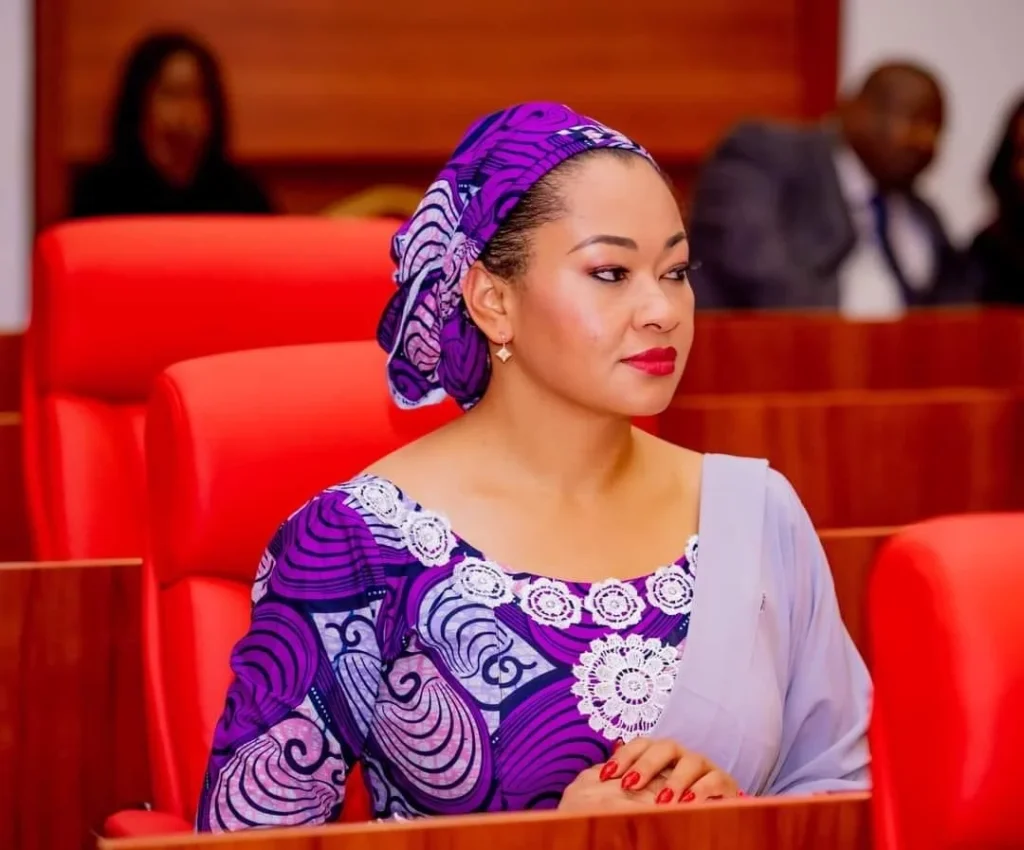
The Nigerian Senate has referred Senator Natasha Akpoti-Uduaghan to its Committee on Ethics, Privileges, and Public Petitions for a disciplinary review following a dispute over seating arrangements in the chamber. The Senate decision, made after a voice vote on Tuesday, comes amid a row over Akpoti-Uduaghan’s altercation with Senate leadership regarding her designated seat. The committee, led by Senator Neda Imaseun, has been given two weeks to investigate the matter and submit its findings. The motion to refer the issue to the committee was raised under Senate Orders 1(b) and 10, with lawmakers emphasising the need to uphold parliamentary decorum and the integrity of Senate proceedings. Senate spokesperson Senator Yemi Adaramodu condemned what he called Akpoti-Uduaghan’s “extreme intransigence” during the February 20 plenary session, noting that the incident had garnered significant media attention. READ ALSO: Drama in Senate as Natasha confronts Akpabio over seat reassignment (VIDEO) Adaramodu stated that the controversy had undermined the public perception of the 10th Senate and urged the leadership to enforce discipline. “The Senate is not a platform for content creation but a place for lawmaking and oversight functions, Where there is sin, there must be a penalty.” Adaramodu said. Supporting Adaramodu’s position, Senate Leader Opeyemi Bamidele stressed the Senate’s commitment to order and integrity, emphasising that the chamber was bound by its rules. He dismissed suggestions that the dispute was a case of gender bias, pointing out that other senior senators had accepted similar seating changes without protest. “We are bound by our rules. Integrity is non-negotiable, Under our watch, we will not allow this institution to be discredited beyond what we inherited.” Bamidele affirmed. In his ruling, Senate President Godswill Akpabio instructed the Ethics Committee to conduct a thorough review of the incident and report back to the chamber. He also commented on Akpoti-Uduaghan’s unfamiliarity with Senate procedures, suggesting it may have contributed to the confrontation. “On her first day in the Senate, I was concerned if she had even read the rule book, There is nothing wrong with being vibrant, but everything wrong with disobeying procedure.” Akpabio said. The Senate President also reminded lawmakers of the importance of adhering to parliamentary rules, citing Order 66(2) and Section 55 of the Senate’s regulations, which prohibit disruptive behaviour, including chewing gum or drinking water during proceedings. The outcome of the Ethics Committee’s review will determine whether any disciplinary actions will be taken against Akpoti-Uduaghan.
Onanuga dismisses Osinbajo’s claim of Babangida tormenting Tinubu
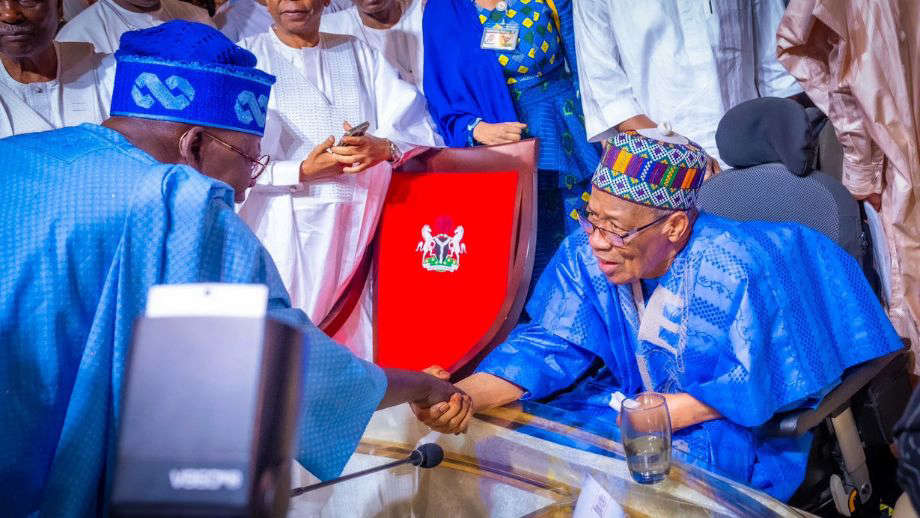
The Special Adviser to President Bola Tinubu on Information and Strategy, Bayo Onanuga, has dismissed claims made by former Vice President Yemi Osinbajo that former military President Ibrahim Babangida was among those who “tormented” Tinubu during the military era. Osinbajo made the remarks last week while reviewing Babangida’s autobiography, A Journey in Service, at its public presentation in Abuja. During the event, Osinbajo recalled how Tinubu, then a senator, had resisted the military’s dissolution of the Senate following the annulment of the June 12, 1993, presidential election. In a lighthearted comment, Osinbajo suggested that Tinubu, who was “tormented” by the military, including Babangida, was now present to celebrate one of his former adversaries. However, speaking on Sunrise Daily, a Channels Television programme, Onanuga refuted Osinbajo’s claim, insisting that Babangida was, in fact, a significant influence on Tinubu’s political journey. “I think the former Vice President got it wrong. Babangida was not really a tormentor of President Tinubu. Don’t forget that in his own speech at the event, Tinubu acknowledged that Babangida inspired him to go into politics,” Onanuga said. Onanuga explained that Babangida’s call for “new-breed” politicians in the late 1980s and early 1990s played a crucial role in attracting several technocrats and private sector professionals, including Tinubu, into politics. READ ALSO: JUNE 12: IBB, Obasanjo, Abubakar belong in jail – Sowore According to Onanuga, it was this vision of bringing in fresh faces that led Tinubu to join the political scene. “The military president had talked about bringing in fresh faces, and many professionals, including Tinubu, heeded that call. So, he went there (the book launch) to pay homage,” Onanuga added. The presidential aide clarified that Tinubu’s real challenges with the military began under General Sani Abacha, when he and some lawmakers attempted to reconvene the Senate in Lagos after it had been dissolved. Onanuga pointed out that it was during Abacha’s rule that Tinubu faced more direct opposition from the military regime. Onanuga also took the opportunity to commend Babangida’s recent admission that Chief MKO Abiola won the 1993 presidential election, a statement that was widely seen as a significant acknowledgment of the democratic legitimacy of Abiola’s mandate. However, Onanuga noted that while the admission was welcome, it came “too late” to undo the damage done during the years of military rule. The exchange has sparked renewed discussions about the complex relationships within Nigeria’s political landscape, particularly regarding the roles played by key figures like Babangida, Osinbajo, and Tinubu during the military era and their impact on the country’s democratic evolution.



